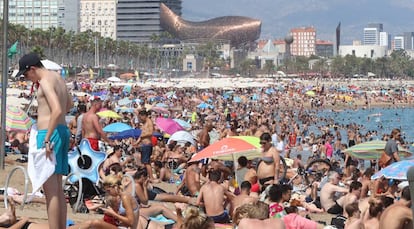How many more tourists can Spain cope with?
Balearic Islands’ limit on visitors raises question of sustainability of sector that makes up 11% of Spanish GDP
Barcelona has placed a moratorium on new hotels in the city center and has come up with a roadmap for reducing tourism in saturated areas, while the Balearic Islands has introduced a law cutting the number of beds available to tourists to 623,624 with a view to gradually settling on a maximum of half a million at any given time.

With residents in some parts of Barcelona and the Balearics resentful toward visitors they accuse of pricing them out of the rental market, the measures taken by the Balearic government could become a model for other regions in Spain struggling to cope with increasing numbers of tourists.
But is this an accurate picture of Spain’s tourism sector? Are the more than 80 million foreign visitors estimated for 2017 really too many for the country to cope with?
The answer is not easy, but the view of many experts is that tourists need to be more evenly spread out over the year and in terms of destination.
The tourism sector itself is keen to curb the number of tourists converging on some cities and resorts. “In certain areas, we have to either restrict the accommodations available or substantially raise prices,” says José Luis Zoreda, vice president and spokesman for Exceltur, Spain’s tourism lobby. “We think the measures introduced in the Balearic Islands are a step in the right direction.”
Either limit capacity or put up prices, says the tourism lobby
The main goal, says Zoreda, is two-fold: to sustain the growth of a sector generating more than 2.5 million jobs and 11% of GDP, while ensuring that growth doesn’t adversely affect the local population.
The cap on beds in the Balearic Islands is nothing new. A similar measure was introduced in 1999 but was undermined by the arrival of online platforms advertising properties that managed to bypass the system.
Now, a year-long embargo has been imposed on Airbnb, HomeAway and other digital platforms: property owners who ignore the ban face hefty fines of around €400,000.
“We can’t take more tourists during the summer season,” says Gabriel Barceló, vice president of Barceló, one of Spain’s leading hotel groups, and who is also a tourism advisor to the Balearic government. “The limits have been exceeded. The balance has to be redressed.”
The policy has been driven by the eco-nationalist party Més, which is determined to refocus the industry toward lower numbers and higher quality. To this end, the Balearic Islands were compared to the Canary Islands, both of which received around 15 million visitors last year, and significant differences were noted.
“The Canary Islands are bigger and there are more of them,” says Barceló. “And the visitors are more evenly spread out over the year.”
A cap on beds was attempted in the Balearic Islands during the 1990s
Both the eco-nationalists and the sector agree that greater diversity is needed. “It doesn’t make sense to talk about a national quota,” says Zoreda. “In Teruel, tourism isn’t a problem and probably never will be. But in Barcelona and Palma, it is.”
Barcelona and Palma have seen mounting anti-tourist sentiments. According to a survey carried out by City Hall in June, for the first time, Barcelona residents flagged up tourism as the city’s main problem.
Experts such as Juan Ignacio Pulido, professor of Applied Economics at the University of Jaén, believes that while capping the number of beds in places such as the Balearic Islands may help, it’s only part of the solution. “The problem in Magaluf isn’t supply, it’s the demand,” he says. “Measures need to be taken to promote responsible tourism and keep the hooligans out. You can’t tar all resorts with the same brush.”
While hotel owners in the Balearic Islands have welcomed the initial restriction on numbers, they have been less keen on further reductions in the future. Meanwhile, Fernando Encinar, the head of idealista.com, a leading property site, says he is “in shock” over the measures. “Within a year, we’ll be seeing people using obscure digital platforms to rent properties and that will be even harder to control. We will see fraud and the abuse of a law that won’t solve anything,” he says.
A more responsible model is being sought to keep out the “hooligan” element
Airbnb and other digital platforms are largely responsible for Spain’s tourism boom and the rise in the number of beds from 800,000 to 3.3 million in the past 20 years.
According to Exceltur, tourist apartments exceeded the number of hotel rooms across 22 cities for the first time in 2016. In their defense, these digital platforms argue that they are redistributing the profits from tourism among the general population, which is of course partly true. But it is also true that many property owners have turned themselves into small businesses. “The growth has been uncontrolled and quotas are needed,” says tourism expert Antonio Bernabé . “Suddenly, tens of thousands of people descend on Barcelona, but it doesn’t have the infrastructure to cope with them.”
Companies benefitting from tourism have spent years rubbing their hands with glee as record upon record has been broken. Now 2017 promises to exceed all expectations, not just because of digital platforms, but because Spain is attracting tourists who might otherwise have gone to other destinations such as Turkey and Tunisia. When these tensions subside, however, Spain will undoubtedly experience a return to more manageable numbers, which is one reason tourism operator TUI is against hiking prices as a deterrent.
Meanwhile, the sector needs to perform a delicate balancing act, involving cutting numbers in specific areas, promoting alternative attractions, avoiding anti-tourist feelings and keeping the German, British and Scandinavian tourists coming.
English version by Heather Galloway.
Tu suscripción se está usando en otro dispositivo
¿Quieres añadir otro usuario a tu suscripción?
Si continúas leyendo en este dispositivo, no se podrá leer en el otro.
FlechaTu suscripción se está usando en otro dispositivo y solo puedes acceder a EL PAÍS desde un dispositivo a la vez.
Si quieres compartir tu cuenta, cambia tu suscripción a la modalidad Premium, así podrás añadir otro usuario. Cada uno accederá con su propia cuenta de email, lo que os permitirá personalizar vuestra experiencia en EL PAÍS.
¿Tienes una suscripción de empresa? Accede aquí para contratar más cuentas.
En el caso de no saber quién está usando tu cuenta, te recomendamos cambiar tu contraseña aquí.
Si decides continuar compartiendo tu cuenta, este mensaje se mostrará en tu dispositivo y en el de la otra persona que está usando tu cuenta de forma indefinida, afectando a tu experiencia de lectura. Puedes consultar aquí los términos y condiciones de la suscripción digital.









































